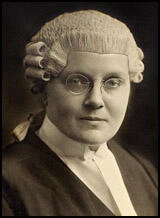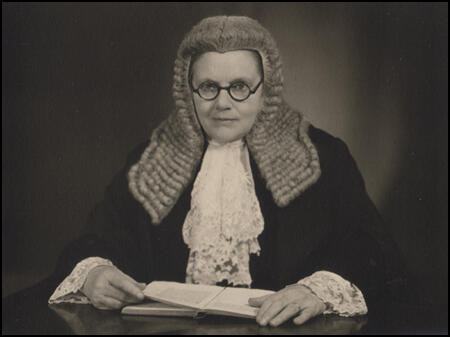Helena Normanton

Helena Normanton, the daughter of William Normanton, a pianoforte manufacturer, was born in London on 14th December 1882. When Helena was aged four, her father, aged 33, was found dead with a broken neck in a railway tunnel. Her mother, Jane Normanton, moved to Brighton with her two young daughters. She ran a small grocery shop and also turned her family home at 4 Clifton Place into a boarding house.
Normanton was a talented student and in 1896 won a scholarship to York Place Science School (later renamed Margaret Hardy School, forerunner of Varndean School for Girls). She eventually became a pupil teacher but on the death of her mother in 1900 she left school to help run the family boarding house and look after her younger sister. The following year she moved to 11 Hampton Place, Hove, a boarding house owned by her aunt, Eliza Whitehead.
In 1903 Helena became a student at the Edge Hill Teachers' Training College in Liverpool. After qualifying in 1905 she taught history in Glasgow and London. Helena was for a time the private tutor to the sons of Baron Maurice de Forest, the Liberal Party MP for West Ham North. Normanton was a strong supporter of women's suffrage and she joined the Women's Social and Political Union (WSPU).
Members of the WSPU began to question the leadership of Emmeline Pankhurst and Christabel Pankhurst. These women objected to the way that the Pankhursts were making decisions without consulting members. They also felt that a small group of wealthy women like Emmeline Pethick-Lawrence were having too much influence over the organisation. In the autumn of 1907, Normanton, Teresa Billington-Greig, Elizabeth How-Martyn, Dora Marsden, Margaret Nevinson and Charlotte Despard and seventy other members of the WSPU left to form the Women's Freedom League (WFL).
Like the WSPU, the Women's Freedom League was a militant organisation that was willing the break the law. As a result, over 100 of their members were sent to prison after being arrested on demonstrations or refusing to pay taxes. However, members of the WFL was a completely non-violent organisation and opposed the WSPU campaign of vandalism against private and commercial property. The WFL were especially critical of the WSPU arson campaign.
Normanton, like most members of the Women's Freedom League, was a pacifist, and so when the First World War was declared in 1914 the organisation refused to become involved in the British Army's recruitment campaign. The WFL also disagreed with the decision of the NUWSS and WSPU to call off the women's suffrage campaign while the war was on. Leaders of the WFL such as Charlotte Despard believed that the British government did not do enough to bring an end to the war and between 1914-1918 supported the campaign of the Women's Peace Council for a negotiated peace.
As well as campaigning for women's suffrage, Normanton wrote several pamphlets on the issue of women's pay. In Sex Differentiation in Salary (1914) she argued for equal pay for equal work. After the First World War she wrote: "During and after the war, many soldiers' wives and widows became the breadwinners for families. Should they be paid according to their sex or their work?"
In 1918 Normanton applied to be admitted to the Middle Temple. When this application was rejected because she was a woman, she took the case to the House of Lords. However, before the case could be heard, Parliament passed the Disqualification (Removal) Bill. Normanton immediately applied again and therefore became the first woman admitted as a student to the bar. After passing her exams she was called to the bar on 17th November 1922, a few months after Ivy Williams, had become the first woman to do so (but she did not practise).
While a student Normanton married Gavin Bowman Clark (1873-1948). As Joanne Workman has pointed out: "Her application to retain her maiden name after her marriage attracted considerable public interest. Helena deplored the loss of a woman's identity on marriage and its disadvantageous legal results. While she believed in the respectability of retaining the title Mrs she also wished to maintain continuity of identity in her professional career." In 1924 she became the first married British woman to be issued a passport in her maiden name.

Normanton gained a great deal of fame "from her writing, public speaking, and feminist activities". This led to claims that she was guilty of advertising her services (forbidden by legal etiquette). In April 1923 she requested the bar council to hold a full inquiry into whether she had ever advertised herself. As this did not happen she curtailed her public speaking engagements and stopped writing for newspapers and magazines.
In 1924 Helena Normanton became the first female counsel in a case at the Old Bailey. The following year she became the first woman to conduct a case in the United States, that established American women's right to retain their maiden names. Despite these achievements her earning from legal work was so low she had to supplement her income by renting rooms in her house in Mecklenburgh Square, Bloomsbury. She also published two books on famous criminal cases, The Trial of Norman Thorne (1929) and The Trial of Alfred Arthur Rouse (1931).
Helena Normanton campaigned for changes in matrimonial law. At the annual meeting of the National Council of Women in October 1934, her proposals were strongly attacked by the Mothers' Union. In 1938 Normanton was co-founder with Vera Brittain, Edith Summerskill and Helen Nutting of the Married Women's Association. The organisation sought equal relationships between men and women in marriage.
Helena Wojtczak remarked in Notable Sussex Women (2008): "In 1948 she became the first woman to lead the prosecution in a murder trial, and the following year became one of the first two women to be appointed King's Counsel. She was an excellent public speaker, wrote articles for various publications and books on a wide variety of subjects, from Shakespeare to buying a house."
In 1952 Helena Normanton made submissions on behalf of the Married Women's Association to the royal commission on marriage and divorce. She proposed that a husband should pay his wife an allowance from the family income. The MWA complained that this suggestion had been submitted to the royal commission "without previous circulation to executive or members". One member complained that her proposal of a housekeeping allowance for wives equated to "pocket money given to a child". As a result of these criticisms, Normanton resigned as president of the MWA.
Normanton was a pacifist and was a member of the Campaign for Nuclear Disarmament. She also played a significant role in the campaign for a university in Brighton. In 1956 she made the first donation to the Sussex University appeal. She wrote at the time: "I make this gift in gratitude for all that Brighton did to educate me when I was left an orphan." This was followed by larger donations and she bequeathed the capital of her trust to the university.
Helena Normanton died on 14th October, 1957, and is buried at St Wulfran's Churchyard in Ovingdean.
Primary Sources
(1) Helena Normanton, The Vote (6th June, 1913)
The worse feature of the married state is that the law enforces no payment for the services rendered by the wife in the house. The work, however difficult or skilled, is rewarded only by subsistence and voluntary gifts by the husband, both absolutely at his discretion.
A married woman needs her husband's consent to contract legally for employment. Savings made from housekeeping allowances, even if made by especial skill in domestic arts, belong by law to the husband.
The glaring inequalities o the Divorce Laws for me and women can be briefly summarised by stating that infidelity only on the part of the woman renders her liable to divorce, whilst cruelty or desertion must also be proved if the man is the guilty party.
A man may obtain damages against the co-respondent who has robbed him of his wife's "honour". A woman cannot sue another woman for damages for robbing her of her husband's "honour".
A wife is bound to follow her husband's domicile or lose her right (such as it is!0 to maintenance. An English woman marrying a foreigner loses her English nationality. Well might she be content to do so, as far as forfeiting anything worth having is concerned, if she marries a subject of the United States or one of our colonies! But in the case of an Englishwoman marrying into any other European nation she may gain little and lose more.
The mother is, of course, not the "parent" of any children born in wedlock. The father has complete control. He decides all questions arising as to their religious and secular education, and they follow him in nationality. But when penalties are imposed, as for cruelty or immoral teaching, the mother shares a liability to punishment and frequently is punished.
The laws relating to inheritance and intestacy show the same spirit as the rest. If a wife dies intestate the husband gets everything and the children nothing. Consequently he may squanter every penny and the children be homeless. A man I not bound by law to leave anything to his wife, but if he should die intestate and there are no children, she gets one-third of his income from landed property, the Crown taking the other two-thirds.
(2) The Daily News (5 February 1924)
For the first time a woman barrister practised at the Old Baily yesterday. She was Helena Normanton, who was also the first woman counsel to appear in the Divorce and Chancery Courts.
She was sitting in wig and gownin the No 4 Court when three men were charged with fraud in what is known as "a long firm case". One of them asked for legal help, and on being requested to select counsel he chose Miss Normanton.
When she turned round he explained. "Oh, I didn't know it was a woman," but added quickly: "But I will stick to my choice."
It proved to be exceedingly complicated case, but Miss Normanton had a good grip of it when she rose to cross examine the first witness.
The case, which is expected to last some days, was adjourned until today.
(3) The Common Cause (8 February 1924)
Normanson was the first woman barrister to appear in the Divorce and Chancery Courts.
(4) Helena Normanton, The Yorkshire Post (26th March, 1954)
Anne Boleyn did not change her name even though she married the King. He at least had the decency to leave her with her own name even though he took her head.
(5) Jennifer Drury, St. Wulfran's Churchyard (2008)
Helena Normanton was one of this country's first women barristers and a great campaigner for women's rights. Her family moved to Brighton in 1886 when she was just four. Helena went to school at what is now Varndean College. She trained initially as a teacher but then studied law and was called to the Bar in 1922. She was the first woman to practice as a barrister, notably at the Old Bailey as criminal defence lawyer. Helena Normanton campaigned and won the right to use her maiden name in her practice - it was unknown then for women not to adopt their married name. She also outraged the married matrons of the time by suggesting that if a woman saved money out of her housekeeping then it was hers to keep. She even suggested they might spend it on cigarettes! Helena Normanton maintained her links with Brighton all her life. She was the first benefactor to donate funds for the establishment of the University of Sussex. In 1999 a portfolio of shares was passed to the university on the death of her one of her relatives - it was worth in excess of £400,000.

